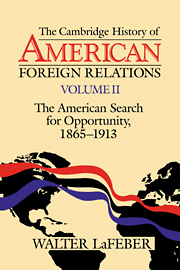Book contents
- Frontmatter
- 1 Springboards and strategies
- 2 The second Industrial Revolution at home and abroad
- 3 Race for empire
- 4 “America Will Take This Continent in Hand Alone”
- 5 Crossing the oceans
- 6 1893–1896: chaos and crises
- 7 The empire of 1898 – and upheaval
- 8 Pacific empire – and upheaval
- 9 Theodore Roosevelt: conservative as revolutionary
- 10 William Howard Taft and the age of revolution
- Conclusion: The 1865–1913 Era Restated
- Bibliographic Essay
- Index
- THE CAMBRIDGE HISTORY OF AMERICAN FOREIGN RELATIONS
- References
- Frontmatter
- 1 Springboards and strategies
- 2 The second Industrial Revolution at home and abroad
- 3 Race for empire
- 4 “America Will Take This Continent in Hand Alone”
- 5 Crossing the oceans
- 6 1893–1896: chaos and crises
- 7 The empire of 1898 – and upheaval
- 8 Pacific empire – and upheaval
- 9 Theodore Roosevelt: conservative as revolutionary
- 10 William Howard Taft and the age of revolution
- Conclusion: The 1865–1913 Era Restated
- Bibliographic Essay
- Index
- THE CAMBRIDGE HISTORY OF AMERICAN FOREIGN RELATIONS
- References
Summary
The American population is a mosaic, a people whose makeup can resemble the world with which it deals in foreign policy. Between the Civil War and World War I the mosaic became so pronounced, and the number of immigrants so enormous, that a historic turn was reached in the 1880s when, for the first time in the nation’s life, legislation excluded certain immigrants (in this case, Chinese). The exclusionary act was shaped by the economic downturn, but also by a deep-seated racism that, while it excluded some Asians, led to the lynching of numbers of Asians and African Americans in the 1880s and 1890s. It also melded with chaotic and tragic economic conditions in the West to produce a series of wars waged by the U.S. Army against Indians. With the ending of those wars, force had succeeded in consolidating non-Indian control of the continent. Militant laborers and angry farmers only remained to pose a domestic threat to order after 1890. This consolidation of the continent, training of military force, contradictory feelings about immigrants, and, above all, racism not only characterized these late nineteenth-century decades but were central in shaping U.S. foreign policy then and in the new century.
- Type
- Chapter
- Information
- The Cambridge History of American Foreign Relations , pp. 45 - 59Publisher: Cambridge University PressPrint publication year: 1993



